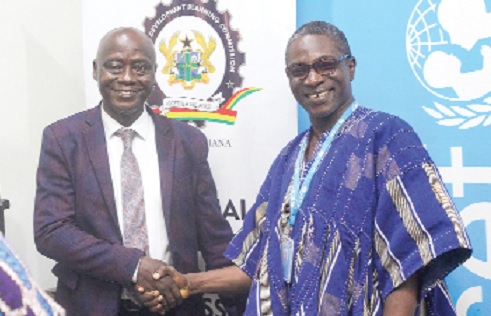
NDPC evaluates medium-term development framework
The National Development Planning Commission (NDPC) has launched the process for the preparation of the terminal evaluation on the implementation of Medium-term National Development Policy Framework (MTNDPF), 2022-2025.
The MINDPF [2022-2025), a strategic guide for the country's development over the past four years, was operationalised in accordance with article 36(1) of the 1992 Constitution and meant to ensure that the economy is managed efficiently to maximise the welfare of the citizenry.
Article 36(1) of the 1992 Constitution states: "The state shall take all necessary action to ensure that the national economy is managed in such a manner as to maximise the rate of economic development and to secure the maximum welfare, freedom and happiness of every person in Ghana and to provide adequate means of livelihood and suitable employment and public assistance to the needy."
The Director-General of the NDPC, Dr Eric Akobeng, launched the evaluation of the framework last Friday, bringing together a multi-stakeholder team of experts to look at the progress made over the past four years.
The scope of the MTNDPF evaluation cuts across six key dimensions - economic; social; natural and built environment; governance; emergency preparedness and resilience; implementation, coordination, monitoring and evaluation.
Commitment
Dr Akobeng said the evaluation would provide an opportunity for the stakeholders to learn from the implementation of the framework, make adjustments, and ensure continuous improvement in line with global best practices in policy design and implementation.
He said the outcome of the evaluation would dovetail into the next MTNDPF, starting 2026 to 2030.
He added that the medium-term goals were important because they would help to build a prosperous country, create opportunities for all citizens, safeguard the natural environment and built environment, maintain a stable, united, and safe country; build resilience to withstand threats of different dimensions, and improve delivery of development outcomes at all levels.
Dr Akobeng said the NDPC was committed to ensuring that members of the public and stakeholders were updated on the state of affairs.
Context
The NMTDPF, which is produced under the leadership of NDPC every four years, is the main document which captures the aspirations of Ghanaians, both adults and children, and outlines all the national and local level actions towards reaching those aspirations.
The MINDPF serves as a guide in line with the National Development Planning Commission Act, 1994 (Act 479), and the National Development Planning (System) Act, 1994 (Act 480) for the preparation of district, sectoral and regional development plans in line with national development intentions.
UNICEF support
Over the last four years, the United Nations Children's Fund (UNICEF) has supported the government towards the implementation of the policy framework.
A social policy specialist at UNICEF, Charles Dzradosi, said the Fund had supported the implementation of the framework, especially so when it had components that sought to ensure that the rights of children were protected, as enshrined in the Convention on the Rights of the Child, the Children’s Act of Ghana, the African Charter on the Rights and Welfare of the Child as well as in the Sustainable Development Goals (SDGs).
He said UNICEF had an avowed objective to support government’s evaluation systems for policies and plans at all levels.
"This means supporting the strengthening of the evaluation functions of NDPC, ministries, departments and agencies (MDAs) and the metropolitan, municipal and district assemblies (MMDAs) to meet and even exceed the United Nations Evaluation Group (UNEG) norms and standards, to ensure that all UNICEF commitments are met throughout the process," he said.
Mr Dzradosi added that it was with that intent that UNICEF was pleased to support the terminal evaluation of the NMDTPF.
"It is our hope and expectation that the outcomes of this evaluation process will provide not just a compendium of policies and activities that have been implemented or not, but also ask questions about how equitable they are, whether they are human-rights based and whether they are disability inclusive," he observed.
